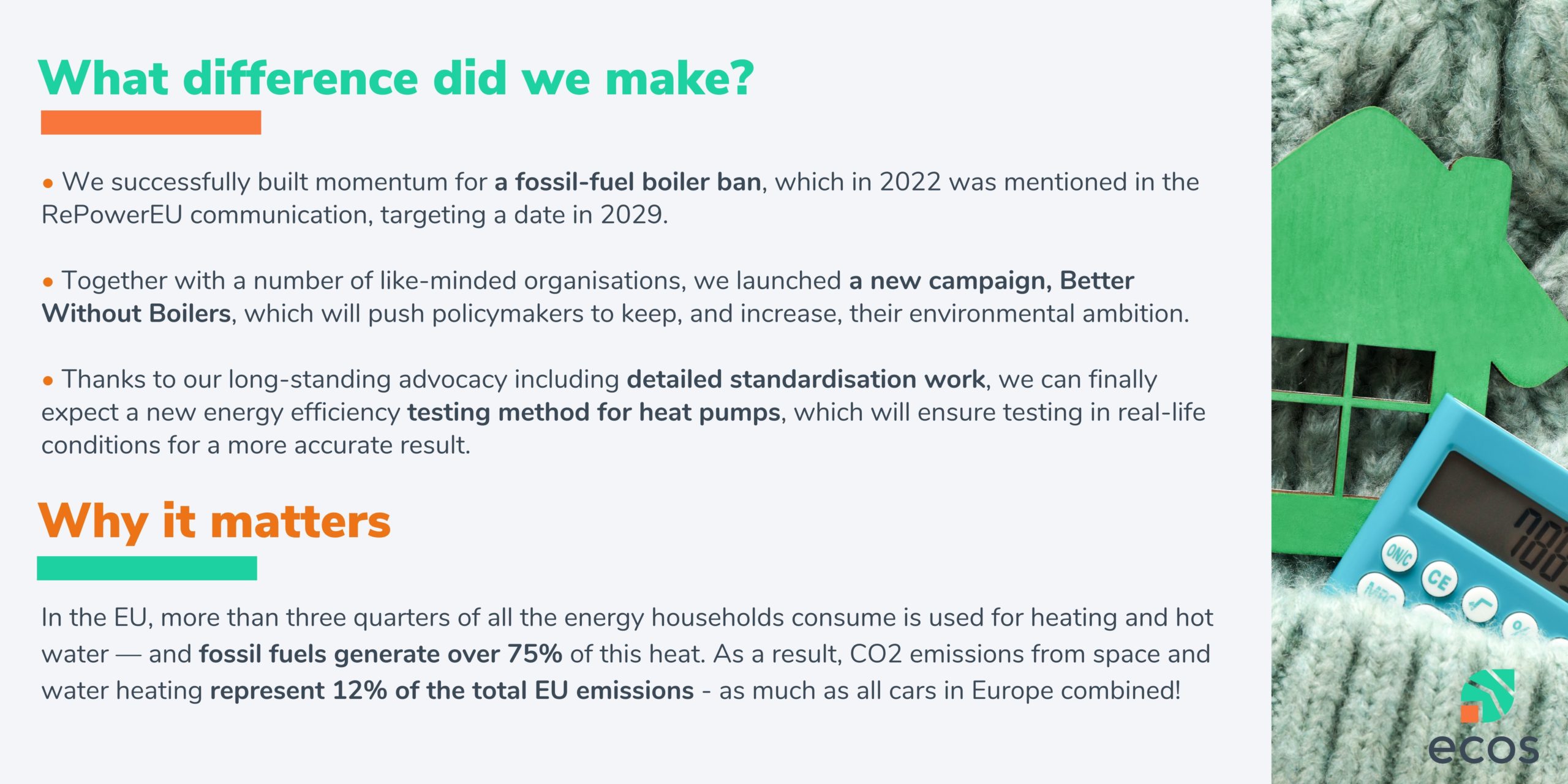Towards a future of efficient, renewable and clean heating
As pointed out in our 2020 report, a timely phase-out of fossil fuel boilers would result in an environmental gain of about 110 Mt CO2 by 2050. This represents two thirds of the total emissions reduction needed from residential and public buildings to achieve climate neutrality by 2050. We advocated for steps in this direction in 2022.

Fossil fuel frenzy
To curb climate change, we must transition to efficient, renewable and clean heating. In the EU, more than three quarters of all the energy households consume is used for heating and hot water — and fossil fuels generate over 75% of this heat. As a result, CO2 emissions from space and water heating represent 12% of the total EU emissions – as much as all cars in Europe combined! To make matters worse, over 80 million European households heat their homes with wood, even though scientists have long warned that burning more wood to replace fossil fuels puts climate objectives at risk.
We need to reduce heating demand by insulating our homes better, and drastically improving the efficiency of the appliances we use. It is time for a switch to F-gas-free electric heat pumps and solar heating solutions.
The 2022 energy crisis certainly put the spotlight on heating. Even though we had always known that fossil gas accounted for around 42% of energy used for heating our homes, it is the soaring gas prices that made the world realise how acutely, how urgently we needed the change. Looking beyond the energy crisis and towards a healthier future, though, we need clean, fossil-free heating solutions in the built environment if we are to even think of meeting our climate goals.
As the key NGO working on both (ecodesign) policy and standardisation, in 2022 ECOS pushed to ensure a future of clean heating. Be it with the long-standing Coolproducts campaign, in the Ecodesign Consultation Forum, in Technical Committees working on standards, writing reports or launching new initiatives… we covered all the angles, and left no stone unturned.
Ban on fossil fuel boilers is possible – as of 2029
In 2022, we were happy to see the EU move in the right direction on heating decarbonisation – but we haven’t reached the finish line yet. We must ensure the best ideas become a reality.
For years, we have been building momentum for a fossil-fuel boiler ban, including in calls, publications, campaigns and letters. Our report, echoed in many publications ever since its release in 2020, made it very clear: we had absolutely no time to lose, and should end the sales of new fossil fuel operated boilers by 2025.
The clock kept ticking, until two years later, in 2022, the EU finally proposed a date to end the sale of such boilers in its EU Save Energy plan (REPower EU communication). The date is imperfect and not set in stone, but the proposed ban on ‘stand-alone’ fossil fuel boilers by 2029 gives us something concrete to work towards in the coming years.
Our new campaign, launched in late 2022 together with a number of like-minded organisations, aims to ensure policymakers see their promises through. Make sure you follow Better Without Boilers in 2023!
What about wood? We wouldn’t!
It is clear that the path towards heating decarbonisation is paved with highly efficient and clean electric heat pumps and solar energy. Nonetheless, some see a role for biomass in the transition, considering it is a renewable solution. Is it though?
In 2022, we argued that competing uses for wood mean that political and economic choices must be made on the basis of a ‘cascading use principle’ to ensure that resources are used optimally. First, wood should be available for long-lasting, high-value uses such as wood-based products. Then, it can be reused for similar or different applications and be materially recycled to create new products. Finally, and only at the end of its useful material life, wood may be burned for energy. Never the other way around.
At the same time, we should not overlook the fact that solid fuel heating releases harmful pollutants into the atmosphere, including particulate matter (PM) and nitrogen oxides (NOx). The 2022 Air Quality Directive Working Document echoed our recommendations on the allowed pollutant limits, which will substantially help reduce the environmental impact of the most polluting solid fuel heating appliances.
Standards for heating our homes, not the planet
Our work on advocacy and policy is extensive but the ‘S’ in ECOS is of equal importance. In 2022, we of course focused on standards, creating impact there, too. In line with our calls, the 2023 draft preliminary Annual Union Work Programme for European Standardisation highlighted the need to revise and draft standards on solid fuel boilers and space and water heaters, to ensure the development of robust methods to measure energy consumption and the emissions of pollutants.
What is more, thanks to our long-standing advocacy including standardisation work and publications, we can finally expect a new energy efficiency testing method for heat pumps, which will ensure testing in real-life conditions for a more accurate result. Yet another piece of the puzzle falling into place in this complicated picture.
The climate emergency we live in, exacerbated by global political instability as well as the economic and inflationary crisis, highlights more than ever the insanity of continuing to use fossil fuels. The EU is well placed to begin a global transition if it follows through on its proposal to ban ‘stand-alone’ fossil fuel boilers. ECOS will keep pushing, until a clean and healthy future is finally secured.


